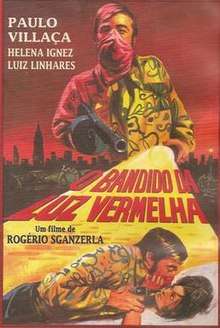The Red Light Bandit
The Red Light Bandit (Portuguese: O Bandido da Luz Vermelha) is a 1968 Brazilian crime film directed by Rogério Sganzerla,[1] inspired by the crimes of the real-life burglar João Acácio Pereira da Costa, known as the "Red Light Bandit" (Bandido da Luz Vermelha).[2] The film is a representative work of cinema marginal, the Brazilian underground filmmaking movement of the 1960s. Sganzerla was 21 years old when he directed it.[3]
| The Red Light Bandit | |
|---|---|
 Original Brazilian release poster | |
| Directed by | Rogério Sganzerla |
| Produced by | José da Costa Cordeiro José Alberto Reis Rogério Sganzerla |
| Written by | Rogério Sganzerla |
| Starring | Paulo Villaça Helena Ignez Luiz Linhares |
| Narrated by | Hélio Aguiar |
| Music by | Rogério Sganzerla |
| Cinematography | Peter Overbeck |
| Edited by | Silvio Renoldi |
Production company | Urano Filmes |
| Distributed by | Sagres Filmes (VHS release) |
Release date |
|
Running time | 92 minutes |
| Country | Brazil |
| Language | Portuguese |
Sganzerla called the film a Third World western. [4]
Plot
Jorge, a São Paulo house burglar, nicknamed by the press the "Red Light Bandit", baffles the police by using peculiar techniques. Always carrying a red flashlight, he rapes his victims, has long dialogues with them and makes daring escapes. Afterwards, he spends the profits of his crimes. The bandit's exploits are shown in a fragmented manner, voiced over by two narrators in the style of a sensationalistic radio program.
He has an affair with the femme fatale Janete Jane, meets other burglars and a corrupt politician, and gets betrayed. Pursued and cornered, he commits suicide.
Cast
- Paulo Villaça as Jorge, the Red Light Bandit
- Helena Ignez as Janete Jane
- Luiz Linhares as police officer Cabeção
- Pagano Sobrinho as J.B. da Silva
- Roberto Luna as Lucho Gatica
- José Marinho as Tarzan
- Ezequiel Neves as Reporter
- Sérgio Mamberti as Homosexual
- Renato Consorte as TV host
- Sérgio Hingst as Millionaire
- Lola Brah as Rich Woman
- Antonio Lima as Gangster
- Ozualdo Candeias as Criminal
- Maurice Capovilla as Gangster
- Carlos Reichenbach as Gangster
Reception
Film critic Ismail Xavier stated that the film treats the bandit's social millieu with irony, making use of collage, intertextuality and pastiche, in contrast with the Cinema Novo's naturalistic filmmaking.[1]
In 2015, The Red Light Bandit was chosen by Abraccine as the sixth best Brazilian film of all time.[5]
Awards and nominations
1968 Festival de Brasília (Brazil)[6]
- Best Costume
- Best Director
- Best Editing
- Best Film
Sequel
A sequel directed by Ícaro Martins and Helena Ignez, widow of Sganzerla, was released in 2010: Luz nas Trevas - A Volta do Bandido da Luz Vermelha.[7][8]
References
- Xavier, Ismail (1997). Allegories of Underdevelopment: Aesthetics and Politics in Modern Brazilian Cinema. U of Minnesota Press. ISBN 9780816626779.
- "Memory of the World National Cinematic Heritage" (PDF). Unesco. 1995. Retrieved 17 February 2016.
- "Rep Diary: Tropicália - Film Comment". Film Comment. Retrieved 2016-02-17.
- Sganzerla, Rogério (2008). O bandido da luz vermelha: argumento e roteiro (in Portuguese). Imprensa Oficial Do Estado. ISBN 978-85-7060-669-3.
- "Sem Legenda: 'Limite' lidera os cem melhores filmes brasileiros; veja lista feita pela crítica - 27/11/2015 - Ilustrada". Folha de S.Paulo. Retrieved 2020-07-20.
- Sganzerla, Rogério (2008). O bandido da luz vermelha: argumento e roteiro (in Portuguese). Imprensa Oficial Do Estado. ISBN 9788570606693.
- "Continuação de 'O bandido da luz vermelha' estreia em festival na Suíça". Pop & Arte (in Portuguese). Retrieved 2016-02-17.
- Felperin, Leslie (2010-08-19). "Review: 'Light in Darkness: The Return of the Red Light Bandit'". Variety. Retrieved 2017-07-13.
External links
- The Red Light Bandit on Enciclopédia Itaú Cultural (in Portuguese)
- The Red Light Bandit on IMDb
- The Red Light Bandit at Rotten Tomatoes